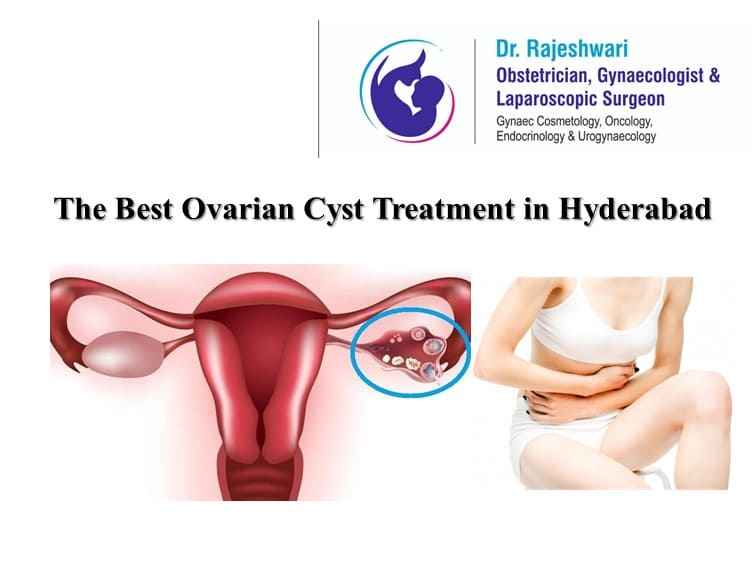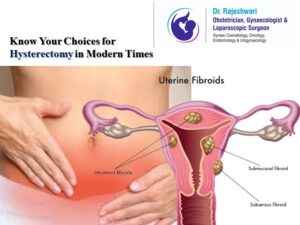Best Ovarian Cyst Treatment in Hyderabad – if you see a gynaecologist for your ovarian cyst treatment, she will provide the best ovarian cyst treatment. However, she needs to consider several aspects before suggesting an apt treatment your ovarian cysts.
When you experience symptoms such as – tummy upset, bloating, lower abdominal pain, a frequent urge to urinate, irregular periods – lighter or heavy periods than normal, difficulty emptying your bowels, painful sex, and sharp, severe pain or a dull to heavy sensation to a sudden pelvic pain – you will see your gynaecologist. She will do a physical examination and medically evaluate your condition. Based on your existing medical condition, symptoms and other factors, your gynaecologist will thoroughly assess your condition. Once she diligently completes her assessment of your specific case – she will decide the next course of action – which means, whether to go for any treatment or carry on wait and watch approach.
In case you came for a routine check-up and incidentally got to know that you have cysts, then she will suggest wait and watch approach if the cyst is small and not causing any symptoms. Usually, most of the cysts do not cause any symptoms.
Typical Symptoms of an Ovarian Cyst
Most ovarian cysts do not cause any symptoms. As cysts grow, they tend to become problematic and cause symptoms including
- Lower abdominal pain
- Low back pain
- back and thigh pain
- Abdominal swelling or bloating
- Painful bowel movements
- Pain before or after menstruation
- Pelvic pain
- Nausea and vomiting
- Painful intercourse
- breast tenderness
Wait and Watch Approach
Gynaecologists usually do not recommend surgery unless it is necessary. If they see that the size of ovarian cyst is small and there is no risk whatsoever is associated with the existing cyst, then they may adopt a wait and watch approach. During this period, the patient may not receive any treatment rather the doctor instructs them to go for ultrasound or scanning – which could be after a few weeks or months later. This process helps in monitoring the growth and development of cyst – size, shape and numbers. In the majority of the cases, the cyst may go or vanish. However, if the cyst persists and causes symptoms, then the treatment begins.
Surgical Treatment
Surgical treatment for ovarian cyst mainly depends on the symptoms and problems associated with the cyst. When the cyst causes symptoms either by remaining the same or becoming larger, then your gynaecologist prefers surgery to remove the cyst. Sometimes the symptoms may become severe requiring urgent care – doctors recommend surgery in such cases as well.
Can a Cyst Become a Medical Emergency?
In some cases, an ovarian cyst can cause extremely severe symptoms as the cyst grow large and twist the ovary itself. Fallopian tubes may also get affected and thus bleeding results. Gynaecologists recommend immediate emergency surgery to prevent further complications. The ovary may also be removed if it is immensely damaged. Sometimes an ovarian cyst causes severe bleeding and pain as it ruptures. The symptoms that manifest when a cyst ruptures may include severe pelvic pain (unbearable and intense pain), dizziness, vomiting or nausea. This is also a very rare medical emergency case.
Ovarian Cyst after Menopause – A cause for concern
Though the presence of ovarian cysts does not increase the risk of ovarian cancer in general, the growth and development of ovarian cysts may slightly increase ovarian cancer risk of a woman if she has reached menopause. Therefore, menopausal women who approach a gynaecologist for treatment are monitored carefully. If a gynaecologist diagnoses ovarian cyst in a postmenopausal woman, she will recommend blood tests and pelvic ultrasound for every three to four months. This is also the case with a woman who is near her menopause. Even in a pre-menopausal woman, ovarian cysts are more likely to turn into cancerous cysts. Depending on an individual case, laparoscopic surgeons suggest surgery – either to remove the cyst or an entire ovary itself.
When you need surgery?
Surgery may not be required if the cyst is getting smaller. Whether you need surgical treatment depends on, your age, your symptoms, health status, the size, the shape, appearance and the number of the cysts; whether you are approaching menopause or premenopausal or you already had menopause.
Irrespective of the reproductive status of a woman, if she has an ovarian cyst that persists or becomes large and is causing symptoms, the cyst needs to be surgically removed.
Cyst Removal Surgery in Hyderabad
Gynaecologists or specialists with laparoscopic surgical expertise recommend either of the following two types of surgeries to remove ovarian cysts:
- Laparoscopic surgery – Laparoscopic ovarian cyst removal surgery – is the best ovarian cyst treatment in Hyderabad
- Laparotomy – (an open surgical procedure to remove an ovarian cyst)
In general, cyst removal surgery is known as a cystectomy. If a non-cancerous cyst causes problems, the cyst is removed surgically leaving the ovary intact. If the cyst damages the entire ovary or both the ovaries – especially when cancer is found, then one or both the ovaries are removed.
Laparoscopy procedure can be used both as a diagnostic and therapeutic procedure. When a laparoscopic surgeon wants to have a close view of the cyst or ovarian growth – she can do so by means of laparoscopy. She will also remove the cyst laparoscopically.
A gynaecologist who specializes in laparoscopic surgery diagnoses reproductive organs’ issues in women such as pelvic inflammatory disease (PID), pelvic infections, fibroids, adhesions and ovarian cysts using laparoscopy. She also performs laparoscopic surgery to treat these issues as well. Learn more about laparoscopy.
Your surgeon may prefer laparotomy if the cyst is large enough to cause severe symptoms and when there is a concern about cancer. Even if the doctor finds ovarian cancer, it can be safely removed.
Some common gynaecological issues – such as polycystic ovarian syndrome (PCOS) cause ovarian cysts. To treat such types of cysts a different treatment approach is adopted – which includes medicines, hormonal therapy or surgery.
Bottom Line
You should see your gynaecologist periodically as in the majority of the cases, ovarian cyst diagnosis is incidental. Majority of the ovarian cysts do not cause any symptoms – and therefore, go unnoticed and undetected for long. Such cysts become large and cause symptoms later. In addition, most of the symptoms if associated seem to be common for many women. They don’t even prefer consulting a gynaecologist rather try some home remedies – which will not provide relief. Some women prefer taking pain-relieving medicines to ease symptoms – these too don’t offer relief. The best bet would be to avail the best ovarian cyst treatment in Hyderabad
Remember – heavy bleeding and severe pelvic and lower abdominal pain may indicate a ruptured or damaged cyst that needs urgent surgical intervention. Sharp shooting and severe pelvic pain, dizziness or faintness, fever, rapid breathing and severe abdominal pain are the symptoms associated with an ovarian cyst that requires immediate medical attention.
If you have any concerns regarding ovarian cysts or if you are looking for the best ovarian cyst treatment in Hyderabad and want to know the complete information about all the available surgical and other treatment options, then book an appointment for one-to-one discussion and counselling with me.
Dr Rajeshwari Reddy
Senior Consultant Obstetrician, Gynaecologist and Laparoscopic Surgeon




